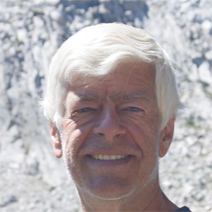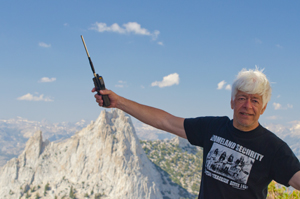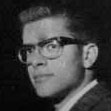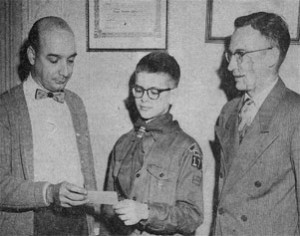 It has been my plan to make several trips into the Yosemite wilderness this summer in order to visit some places I’ve never seen before. Most tourists have seen Yosemite “Valley” and many have seen Tuolumne Meadows. Access to the wilderness areas is controlled by a “permitting” process that limits the number of people who may enter on a wilderness trailhead each day. There are a couple dozen trailheads, and they have quotas of one to two dozen camper-hikers per day per trailhead. Once you’re into the wilderness area, you can pretty much go where you desire, as long as you have the energy and the food. [Read more…]
It has been my plan to make several trips into the Yosemite wilderness this summer in order to visit some places I’ve never seen before. Most tourists have seen Yosemite “Valley” and many have seen Tuolumne Meadows. Access to the wilderness areas is controlled by a “permitting” process that limits the number of people who may enter on a wilderness trailhead each day. There are a couple dozen trailheads, and they have quotas of one to two dozen camper-hikers per day per trailhead. Once you’re into the wilderness area, you can pretty much go where you desire, as long as you have the energy and the food. [Read more…]
SOTA—Summits On The Air
 Since the age of 6, when I visited Estes Park, Colorado, whenever I see any geographical feature more than say 100 meters above me, I climb it. (Provided it’s not a technical climb.) If I can get there without hanging by my fingertips, I go.
Since the age of 6, when I visited Estes Park, Colorado, whenever I see any geographical feature more than say 100 meters above me, I climb it. (Provided it’s not a technical climb.) If I can get there without hanging by my fingertips, I go.
Summits On The Air [SOTA] is an organization that operates mostly in Europe and the US, which encourages amateur radio operation from mountain peaks. In many areas these are really just large hills, but here the western mountains of the US, we have many hundreds of peaks that are truly mountains and not just high spots. [Read more…]
73 and 86
 Someone asked today about the meaning of “73” as used by amateur radio operators. It essentially means “Bye” or “Best wishes” and is used when you’re done talking to someone and signing off…as in “I’ll say 73 for now.”
Someone asked today about the meaning of “73” as used by amateur radio operators. It essentially means “Bye” or “Best wishes” and is used when you’re done talking to someone and signing off…as in “I’ll say 73 for now.”
I remembered that 73 was a “message number” as used by amateur operators in the 1950s when I got my license, so I looked further.
I got the lead I needed from SignalHarbor who says that in the April, 1935 issue of QST magazine, on page 60, there is an article “On the Origin of 73” — and that is correct! I looked it up (ARRL members can read old QST issues online). They quote from “Telegraph and Telephone Age” 1 June, 1934 (which I could not find), and list the following message numbers:
- 1- Wait a minute
- 4- Where shall I start in message?
- 5- Have you anything for me?
- 9- Attention, or clear the wire
- 13- I do not understand
- 22- Love and kisses
- 25- Busy on another circuit
- 30- Finished, the end
- 73- My compliments or Best regards
- 92- Deliver
“It appears … that in 1859 the telegraph people held a convention, and one of its features was a discussion as to the saving of ‘line time.’ A committee was appointed to devise a code to reduce standard expressions to symbols or figures. The committee worked out a figure code, from figure 1 to 92. … ”
And, of course, “30” is used by lots of people, including newspaper writers at the ends of their stories. Since stories were originally wired or telegraphed, this usage of “30” makes a lot of sense.
So where does “86” come from then? One of my favorites, but it’s not a telegrapher’s message. Google it and see which theory you believe. It clearly means “removed from circulation” or “ended” but the theories of its origin are interesting and inconclusive in my opinion.
AA6AX
 Geekiest of the geeks — amateur radio operators! (AKA “Hams”)
Geekiest of the geeks — amateur radio operators! (AKA “Hams”)
Inquiries or QSL “cards” » QSL@aa6ax.us
I’ve had an amateur radio license since 1958 when I was in sixth grade—back in Illinois. A bunch of old WWII veterans got me involved as a favor to my father (who was one of the “country doctors” for the area). I started studying the electronics theory and the Morse code when I was 10. Their club meetings were held in a smoky room over one of the downtown stores, and I routinely got sick due to the smoky air. Code practice was on the radio once a week, and I could borrow a perforated paper tape “code practice” machine to fine-tune my skills. It wasn’t easy to get the license!
 As a geeky little introverted kid, amateur radio was not really my thing, though morse code (CW) was kind of neat and a fun challenge. It also meant I didn’t have to think of much to say. I never was much for small talk.
As a geeky little introverted kid, amateur radio was not really my thing, though morse code (CW) was kind of neat and a fun challenge. It also meant I didn’t have to think of much to say. I never was much for small talk.
The image of ham radio operators is that they are the geekiest of the radio geeks – carrying around little hand-held radios, long whip antennas on cars, and the obligatory plastic pocket protector that all nerds use. Kinda true, but honestly you’ll find most of them are just the friendliest people in the world! And a lot of this friendly activity takes place “off the air” at various meetings. And getting involved in civilian emergency preparedness is really a kick. The NERT program, sponsored by the San Francisco Fire Department, has a whole group of amateur radio operators who participate in weekly drills and activities. And the Department of Emergency Management of the city also has a program that involves amateur operators as a secondary channel for the Fire Department in case of emergency (ACS).
What I found after getting more active again here in San Francisco is that it’s an interesting way to meet a real cross-section of folks from many ways of life, professions, interests, and actually it’s kind of neat to see whether a little 5 watt radio can really allow me to be in a mountain peak in the High Sierras (in the summer) and talk to a friend back in the San Francisco Bay Area.
One of my friends here in the East Bay is a true aficionado, and a great “found-items” artists as well. KY6R
Stop #SOPA #PIPA Wikipedia + Google turned the tide
 For almost two months I’ve been quite aware of how the US Congress wants to impose their will on the Internet as a whole. Aw, comeon—everyone wants to impose their ideas on the Internet! Of course, China, Saudi Arabia, Iran, Syria and Burma (among others) do impose their will(s) on the Internet by filtering and other actions.
For almost two months I’ve been quite aware of how the US Congress wants to impose their will on the Internet as a whole. Aw, comeon—everyone wants to impose their ideas on the Internet! Of course, China, Saudi Arabia, Iran, Syria and Burma (among others) do impose their will(s) on the Internet by filtering and other actions.
If the US were to institute laws that allow the Attorney General and/or companies to force ISPs to block (or modify the DNS for) domains they assert are in violation of copyright, it would be the beginning of a slippery slope which could well lead to blocking (censorship in effect) for other reasons. There is just not enough due process in these proposed laws. Once the mechanics are in place, it would be easy to justify using them for other purposes.
I was most impressed at the action taken by Wikipedia on January 18th (2012) to make their service unavailable (except via mobile and for certain pages). And Google did a great job by blacking out their logo, leaving their search intact, and providing links to further information, including pages to reach Congresspeople! Craigslist.org also put up a splash page, which I think sent many people in the right direction. Craig Newmark, founder (and customer support) of Craig’s List is very much involved in citizen democracy (“democracy 2.0” if you will). I put up notices on my own sites, and on my friend Amy Jussel’s ShapingYouth.org on the 18th, directing peoples’ attention to the SOPAstrike page. I was also impressed that
The key is to not require that ISPs or search engines be the enforcers of government policies, and to not wreck the DNS (and DNSSEC) system by spoofing (even legally) domain names.
I believe Wikipedia and Google turned the tide, and am hopeful that these misbegotten bills will now be abandoned or completely rewritten to make more sense!
- « Previous Page
- 1
- …
- 5
- 6
- 7
- 8
- 9
- …
- 45
- Next Page »